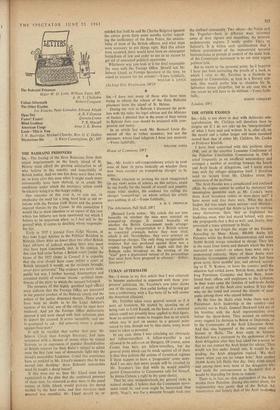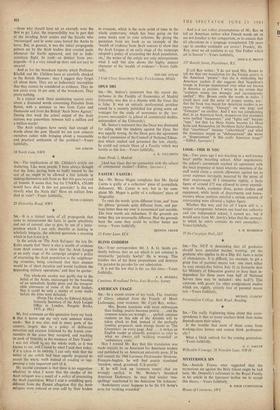THE OTHER EXODUS - SIR,—Life is too short to deal
with deliberate mis- apprehension. Mr. Childers will therefore have to
forgive me if I do not take up his 'interpretations' of what I have said and written. It is, after all, on the record and a rather longer and more sustained record than that of either Mr. Childers, Mr. Cooke or Professor Khalidi.
I have been concerned with this problem since 1948, and at the abortive Lausanne Conference of the Palestine Conciliation Commission in 1949 I acted frequently as an unofficial intermediary and arranged a number of meetings between the Israeli and Arab heads of delegations, and I spent much time with the refugee delegation itself. I therefore need no lecture from Mr. Childers about the seriousness of the problem.
The Arab Exodus was a complicated and confused affair. Its origins cannot be settled by rhetorical but meaningless questions such as Mr. Cooke's 'were there Arab broadcast orders or were there not?' I have never said that there were. What the Arab leaders did was much more serious—and effective: first, they encouraged the Arabs to leave by running away themselves; then, they so frightened the leaderless mass, who had stayed behind, with atro- city propaganda that it fled as well; and, finally, they prevented a truce settlement in Haifa.
But let us not forget the origin of the Exodus. According to Musa Alami, 400,000 Arabs left Palestine while the British Administration and some 50,000 British troops remained in charge. They left in the main from towns and districts where the Jews exercised no control—or where Jews were only a pronounced minority. Many of these Arabs were Palestine Government civil servants who had been given leave, three months' pay, and advised, accord- ing to E. N. Koussa. to leave the country until the situation had settled down. British firms, such as the Iraq Petroleum Company and Steel Bros., trans- ferred their offices and employees to the Lebanon.' In their wake came the families of well-to-do Arabs and of many of the Arab civic leaders. It was they who set the trend and created the climate of near- panic among those who stayed behind.
By the time the Haifa crisis broke there was no Palestinian Arab leadership in the country—and certainly not in Haifa, General Stockwell told me of his troubles with the Arab representatives even before the show-down. They insisted on referring every request for decision to Beirut or Damascus, or to the Commander of the Arab Liberation Army. And this also happened at the crucial truce con- ference in Haifa. The Arab reply to General Stockwell was a statement by the spokesman of the Arab delegation after they had asked for a recess 'so that we can contact the Arab States for advice.' They would not live under Jewish rule. It would be de- grading, the Arab delegation replied. 'We shall return when you are no longer here.' And another 20,000 Arabs left Haifa that day. Only 4,000 stayed and among them were most of the delegation who had made the announcement to Stockwell that it would be degrading for them to remain.
There is, in fact, no slick explanation of the Arab exodus from Palestine. During this initial phase, the responsibility was partly that of the British Ad- ministration and largely that of the Arab leadership —those who should have set an example were the first to go. Later, the responsibility was in part that A the invading Arab armies and the Israelis who encouraged' and in some cases forced the Arabs to Leave. But, in general, it was the initial propaganda pattern set by the Arab leaders that created panic whenever the Iraelis appeared, and led to indis- criminate flight. In truth—as distinct from pro- paganda—it is a very mixed-up story and not easy to unravel.
And as for the broadcast reports which Professor Khalidi and Mr. Childers have so carefully checked in the British Museum: may I suggest they forget all about them. They are so ludicrously incomplete that they cannot be considered as evidence. They do not cover even 10 per cent. of the broadcasts. They prove nothing.
In a typical week these monitoring reports carry about a thousand words concerning Palestine from Beirut, with a sentence or two from Cairo and Damascus and from the British 'Arab News Agency.' During that week the actual output of the Arab stations was somewhere between half a million and a million words!
The Arab refugees have surely had enough of words about the past. Should we not now concern ourselves rather with bringing about a reasonable and practical settlement of the problem?—Yours faithfully,
JON KIMCHE
34 North Gate, NW8



































 Previous page
Previous page